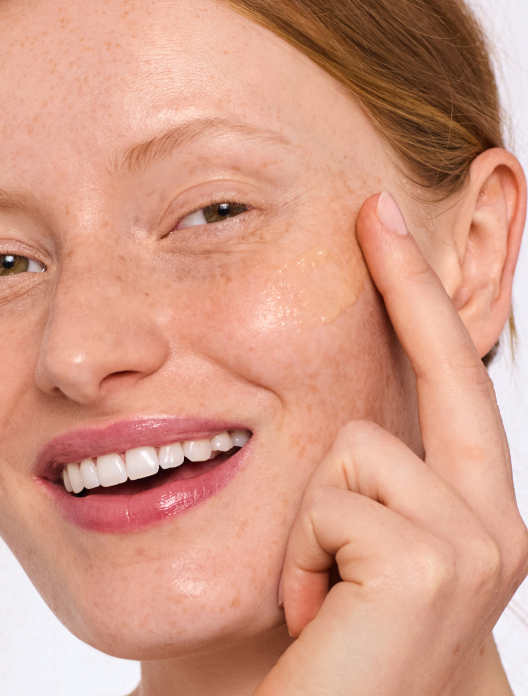

Boost Up
30% vitamin C serum for visibly brighter, glowing skin, suitable for highly experienced skincare users (not for sensitive skin)

To understand just how useful antioxidants are, we first need to wrap our heads around free radicals. Free radicals are molecules in the environment, caused by nasties like pollution, UV rays and cigarette smoke. They’re bad news for the skin, and can lead to premature ageing like wrinkles and pigmentation by damaging proteins like collagen and elastin.
Free radicals are unstable, buzzing around in the atmosphere looking for an electron to pair up with. When free radicals pair with the electrons on the healthy molecules in your skin, those healthy molecules oxidise and become free radicals too.
Antioxidants work by blocking the free radicals, stopping the components of healthy cells from oxidising, which causes damage. Hence the name, anti-oxidant.
A nice way to visualise free radicals is to picture them like a bull in a china shop. They’re crashing into everything, destroying crockery (AKA healthy cells) left, right and centre. Except every time the bull (or free radical) breaks one plate, that plate becomes another bull. And the process repeats itself again and again. Think of antioxidants as a protective glass cabinet, shielding those healthy skin cells from harm.
So, what are antioxidants? Antioxidants are vitamins, minerals or other molecules that protect our skin and insides from free radicals. Common food sources include blueberries, goji berries and kale. In skincare, vitamin C , vitamin E and resveratrol are among the most commonly used antioxidants.
The more antioxidants you consume and apply topically, the better protection you’ll have against free radicals. Think of it like creating a defence network – the more barriers you have in place, the safer you’ll be. Vitamins C and E are a good example of antioxidants that work better together.
Ok, so we’ve established the answer to “what are antioxidants” and understand that they protect skin from free radicals, but what does that actually entail? Firstly, antioxidants will prevent free radicals from prematurely breaking down collagen and elastin. Both of these proteins are responsible for giving skin its softness and bounce. Without them, skin lacks volume, leading to sagging skin and prominent lines.
Antioxidants can also have a role to play in preventing dull skin by shielding it from radiance-robbing external factors. You won’t notice immediate results on this front, but over time your skin should start to regain its glow. With some antioxidants, vitamins C and E in particular, there can be a reduction in the formation of sun spots too, as antioxidants can support your daily SPF to help prevent them from appearing.
To protect your skin, antioxidants are best used during the day. Using them at night will help to support skin’s natural repair processes, and in some cases, help to target concerns such as pigmentation. For maximum benefits, use antioxidants every day. Depending on the antioxidant you choose, it may be a good idea to introduce things like vitamin C slowly, building up your usage if your skin is happy.
Finally, how you store your antioxidants matters too. Some, such as particular vitamin C serums, break down in light and air, so choose formulas that come in opaque, well-sealed containers. The manufacturer should give guidance on the packaging about storage. If in doubt, It’s best to store them somewhere cool that’s out of direct sunlight too, like your dressing table drawer. If your serums or creams have changed dramatically in texture, colour or smell, this is a tell-tale sign that they’re probably past their best.
Shop the article


30% vitamin C serum for visibly brighter, glowing skin, suitable for highly experienced skincare users (not for sensitive skin)
Read, watch and be inspired...